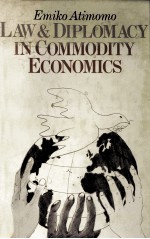

LAW AND DIPLOMACY IN COMMODITY ECONOMICS A STUDY OF TECHNIQUESPDF电子书下载
- 电子书积分:13 积分如何计算积分?
- 作 者:CO-OPERATION AND CONFLICT IN INTERNATIONAL PUBLIC ISSUES
- 出 版 社:
- 出版年份:1981
- ISBN:0333277457
- 页数:384 页
PART ONE GENERAL CHARACTERISTICS OF INTERNATIONAL ECONOMIC LAW AND DIPLOMACY 3
PRELIMINARY CONSIDERATIONS 3
1 CHARACTERISTICS 6
Ⅰ Legal Nature and Scope of Economic Diplomacy 6
Ⅱ Traditional International Law and Modern Economic Diplomacy in the Areas of Application 7
Ⅲ Methodology in International Economic Law and Diplomacy 11
Ⅳ The Role of Traditional Diplomacy in the Modern World of Economic Transactions 14
2 DIPLOMATIC TECHNIQUES 19
Ⅰ Techniques of Negotiation in International Economic Law and Diplomacy 19
Ⅱ Institutional and Administrative Techniques 22
Ⅲ Stabilisation Techniques 24
3 DIPLOMATIC PREREQUISITES FOR LEGAL TECHNIQUES 34
Introduction 34
Ⅰ Verification of Credentials and Full Powers 34
Ⅱ Drafting and the Jurist in International Economic Negotiations 40
4 LEGAL TECHNIQUES: CONCLUSION AND ENTRY INTO FORCE 53
Introduction 53
Ⅰ Signature of an Agreement 55
Ⅱ Ratification, Acceptance or Approval of an Agreement 62
5 LEGAL TECHNIQUES; THE SCOPE OF APPLICATION OF THE LEGAL OBLIGATIONS IN COMMODITY AGREEMENTS 74
Ⅰ Duration of Application 74
Ⅱ Renewal of an Agreement 78
Ⅲ Date of Entry into Force 79
Ⅳ Rationae Personae Effects of Commodity Agreements 83
Ⅴ States and the Territorial Applicability of Commodity Agreements 90
Ⅵ Procedure of Amendments 90
6 LEGAL TECHNIQUES: CONFLICT RESOLUTION AND HEADQUARTERS AGREEMENT 93
Ⅰ The Techniques of Conflict Resolution in Commodity Institutions 93
Ⅱ Headquarters Agreement: Diplomatic Privileges and Immunities 109
7 TIN IN INTERNATIONAL METALLIC DIPLOMACY: CASE STUDY ONE 119
Introduction: Notes on the Importance of Tin 119
Ⅰ Diplomatic Nature of Tin Conferences 121
Ⅱ Voting Procedures in the 3rd Agreement 134
Ⅲ Functioning Mechanism of the Tin Agreements: Source of Legal Obligations 146
Ⅳ Permanent and Administrative Institutions of the Agreement 158
Ⅴ An Examination of the 4th International Tin Agreement as an Instrument of Commodity Stablisation 163
8 COFFEE IN INTERNATIONAL AGRICULTURAL DIPLOMACY: CASE STUDY TWO 168
Introduction 168
Ⅰ The Coffee Problem 169
Ⅱ Diplomatic Nature of Coffee Conferences 171
Ⅲ The Coffee Agreements 179
Ⅳ Voting Procedures 194
Ⅴ Permanent and Administrative Institutions of the Agreement 198
PART TWO CONFLICT AND CO-OPERATION IN COMMODITY DIPLOMACY 205
9 GENERAL ECONOMIC SCOPE OF THE PROBLEM 205
Ⅰ Economic Situation 205
Ⅱ Problems of Commodity Marketing: the Examples of Citrus Fruits (Orange, Lime, Citron, Grapefruit),Bananas and Tea 207
Ⅲ World Commodity Situation 208
Ⅳ Experience of International Commodity Agreements 211
Ⅴ Co-operation Attempts by Producers of Agricultural Commodities 214
Ⅵ Co-operation Attempts by Producers of Minerals and Metals 216
Ⅶ The Problem of Conflict and Co-operation 217
10 COMMODITY DIPLOMACY WITHIN THE UNITED NATIONS SYSTEM 224
Ⅰ Under UNCTAD Conferences 224
Ⅱ Under the General Assembly of the United Nations 250
Ⅲ Co-operation Among Third World International Economic Integration Organisations 268
11 COMMODITY AGREEMENTS UNDER A QUASI-UNITED NATIONS SYSTEM 309
Ⅰ The Cocoa Diplomacy 309
Ⅱ The Tin Diplomacy 317
12 FINAL REMARKS 323
Ⅰ The Plight of Poor Nations 323
Ⅱ For a Flexible Trade Policy 325
Ⅲ The Need to Restructure the Internal Political Order of Developing Countries as a Prerequisite for Attaining the Desired International Economic Order 326
Ⅳ Legal and Diplomatic Dimensions 329
Notes 331
Further Reading 363
Index 372
